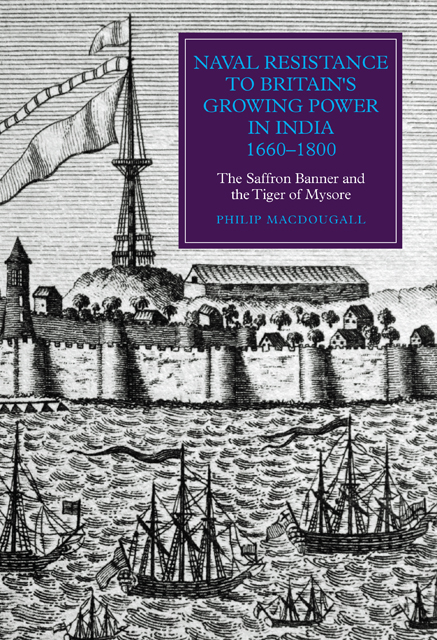 Naval Resistance to Britain's Growing Power in India, 1660–1800
Naval Resistance to Britain's Growing Power in India, 1660–1800 Published online by Cambridge University Press: 23 February 2023
The surest way for the nation states and principalities of India to resist the growing power of the British or, for that matter, any other European power would have been through the presentation of a united front. It was fundamentally the disunity existing across the continent that permitted first one and then a number of other European powers to gain a series of secure footholds. Having done so, and through collaboration with one indigenous ruler against another, each of the more powerful European contenders was able to extend their influence not only across the coastal regions but ultimately into extensive areas of the interior. A united India, with sufficient resolve, might never have allowed such a situation to develop. Providing supporting evidence, consideration need only be given to the course of events played out in China during roughly the same period. Here, under the firm hand of the Qing Dynasty, European traders, who were fundamentally the same as those seeking dominance in India, were carefully controlled. Instead of having a free hand to establish factories wherever they chose, the Europeans in China were restricted to the southern cities of Canton (Guangzhou) and Macau, where harsh rules governing their activities were laid down and enforced.
While accepting that a unity of governance existed across China, this sharply contrasting with the disunity and frequency of warfare within the sub-continent of India, there are two important similarities between India and China that need to be noted. First and foremost was that all of the European trading companies reaching out to China had received charters issued by their own governments that provided each with an exclusive right to trade between their own country and both India and China, so ensuring that actions advantageous to them taken in one of these two areas of trade would be transferred if possible to the other. Consequently, if the Chinese ruling Qing Dynasty had been less than resolute in its control of the European traders, then a similar scenario to that seen in India would also have been played out here. Furthermore, given that a major source of wealth upon which these companies depended was that of tea purchased in China, then a stronger foothold in that country would clearly have maximised the already considerable profits being earned.
To save this book to your Kindle, first ensure no-reply@cambridge.org is added to your Approved Personal Document E-mail List under your Personal Document Settings on the Manage Your Content and Devices page of your Amazon account. Then enter the ‘name’ part of your Kindle email address below. Find out more about saving to your Kindle.
Note you can select to save to either the @free.kindle.com or @kindle.com variations. ‘@free.kindle.com’ emails are free but can only be saved to your device when it is connected to wi-fi. ‘@kindle.com’ emails can be delivered even when you are not connected to wi-fi, but note that service fees apply.
Find out more about the Kindle Personal Document Service.
To save content items to your account, please confirm that you agree to abide by our usage policies. If this is the first time you use this feature, you will be asked to authorise Cambridge Core to connect with your account. Find out more about saving content to Dropbox.
To save content items to your account, please confirm that you agree to abide by our usage policies. If this is the first time you use this feature, you will be asked to authorise Cambridge Core to connect with your account. Find out more about saving content to Google Drive.